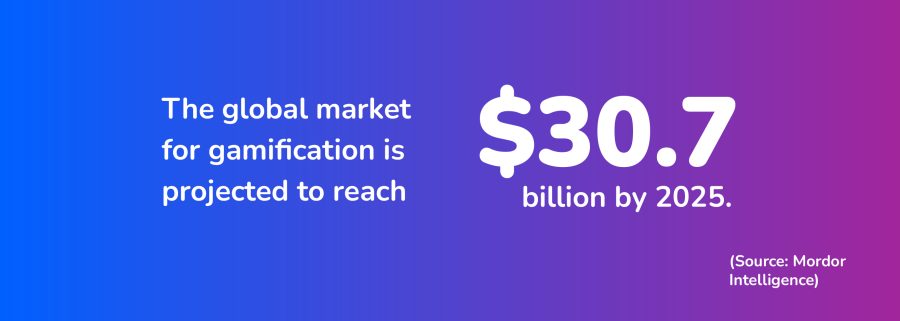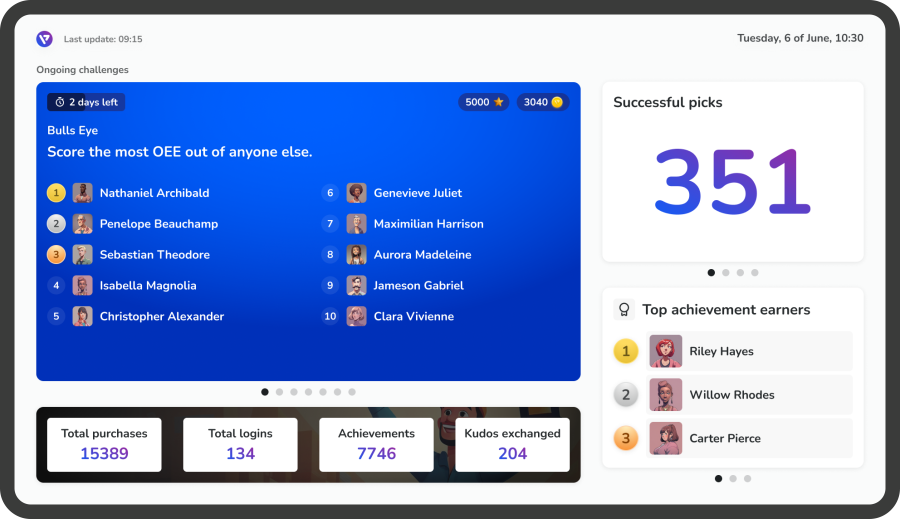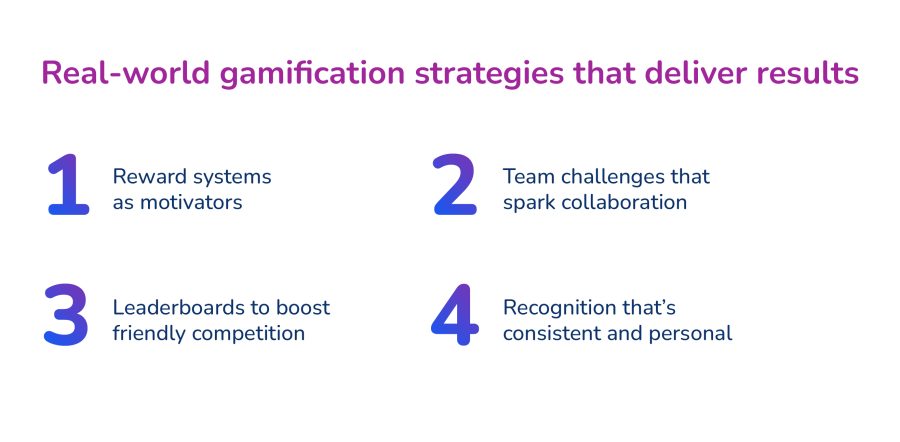Implementing gamification solutions in the workplace can be a driver of business results. Let’s explore how.

Back to Blog
By now, the benefits of gamification in the workplace are well-documented.
Increased motivation, stronger team collaboration, better communication, and higher productivity are just a few of those advantages. And companies seem to know this, as gamification adoption is set to continue growing in several sectors, with the global market projected to reach $30.7 billion by 2025.
But the real question is: how is gamification actually transforming workplaces? What does it look like in action? And how can software companies use it to deliver more value to their clients? Let’s dive in.

Gamification in the workplace is the use of game-like elements to make work more engaging and goal-oriented. And no, gamification does not turn the workplace into a playground. It rather taps into what makes games effective: clear goals, instant feedback, and recognition for progress.
At its core, gamification works because it uses powerful human motivators, the same ones that keep us hooked on games in our personal lives. Gamification strategies create meaningful experiences that encourage employees to engage in behaviors that benefit both them and the organization.
When employees are presented with challenges that feel achievable yet rewarding, it triggers intrinsic motivation, which is the desire to improve, grow, and master a skill for its own sake.
Adding game-like mechanics such as leaderboards, points, and badges provides instant recognition, validating effort and reinforcing progress. Over time, these small, rewarding moments help to build habits and consistency, as employees begin to associate their actions with a clear sense of purpose and achievement.
Gamification can be implemented in several ways, and companies are already making use of Let’s see some examples and analyze how these strategies are creating more productive work environments.
Points are powerful, but only when tied to real-world value. Think gift-cards, access to learning opportunities, or even some extra time-off – who would say no to that, right?
With a gamification solution, companies can create a transparent points system where employees earn rewards for hitting goals, helping others, or completing training. This transforms routine tasks into motivating milestones.
With vaibe, managers set up a digital store where employees can see the rewards available and how many points they need to earn to get them.
Gamified challenges that require cooperation build stronger teams, which build a stronger company and boost results.
Whether it’s a department-wide productivity challenge or a cross-functional problem-solving sprint, team-based goals help employees feel connected to the task and to each other.
vaibe let’s you set up several types of Team Challenges:

When used well, leaderboards can create an environment of healthy competition. Who is the top performer of the weeks? Who gave, or received, more kudos? Who is winning a specific challenge?
All of this can be implemented in a leaderboard, ensuring visibility and motivation without alienating employees who aren’t naturally competitive.
To make challenges more visible and exciting, vaibe has a Display Screen that companies can share in public office spaces. This way, everyone can stay up to date on the challenges and see real-time changes in the rankings.
The small things matter. Recognizing micro-achievements with earned badges or status levels can go a long way in making employees feel appreciated.
With a gamification solution, this recognition becomes systematic, not something that happens once a year at a performance review. A great way to do this is by using the vaibe app where employees can publicly give kudos to other employees.
Gamification influences business results by mapping specific mechanics to measurable KPIs, and creating a clear link between engagement strategies and performance outcomes.
For example, when companies incorporate points systems, leaderboards, and progress tracking into employee workflows, KPIs related to productivity, such as tasks completed per week or sales closed per month, often increase significantly. This is because visible progress and competitive elements provide immediate feedback and motivation.
According to a TalentLMS survey, 89% of employees feel more productive in a gamified workplace, which can lead to a bigger output for the company.
The collaboration and problem-solving promoted by team challenges improves cross-functional communication and innovation. When communication is improved, it has a positive impact in all business aspects: a boost in employee engagement, better client relations, a healthy workplace culture and improved public impression.
When implemented thoughtfully, Leaderboards add a layer of friendly competition that drives performance without creating a toxic work environment. And finally, consistent, personalized recognition strengthens employees’ sense of purpose and belonging.
Over time, these actions lead to higher employee retention, stronger team cohesion, and improved overall performance – all key drivers of sustainable business growth.

If you’re part of a software company, gamification can be the strategic tool to improve client onboarding, boost feature adoption and drive customer loyalty.
One of the biggest challenges that software companies face is ensuring that clients’ employees or customers actually use the software consistently. By adding progress indicators, onboarding “missions,” and achievement badges for completing specific tasks, clients see faster adoption curves and lower churn.
Gamification is no longer a “nice to have.” It’s a strategic advantage. With a gamification solution like vaibe, your clients will be able to implement gamification strategies aligned with business goals and measure their growth.
Let vaibe show you the way – book your demo now.
Discover how gamification can tackle common workplace communication challenges and boost engagement.
Learn how intrinsic and extrinsic motivation can be increased with the right tools in any team.
Understand how to immediately start boosting business productivity with gamification tools that drive real results.